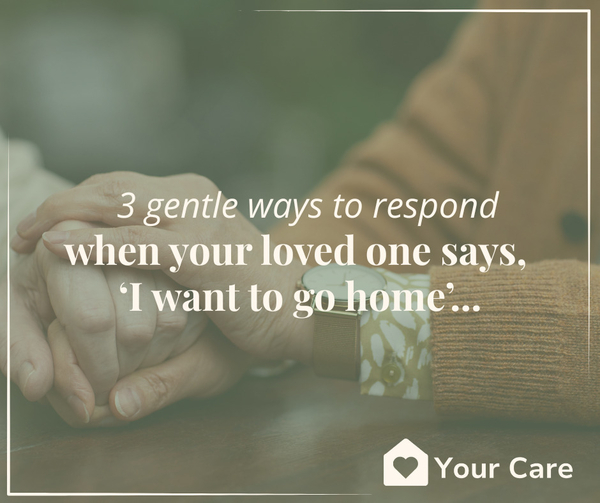Blog

3 gentle ways to respond when your loved one says, “I want to go home”
Thursday 18th September 2025
If you care for someone living with dementia, you may have heard them say, “I want to go home” – sometimes even when they’re already there.
It can be difficult to hear and upsetting to know how best to respond. Trying to explain that they are home rarely helps. In fact, it can often cause more distress.
Why does this happen?
When someone with dementia says “I want to go home,” it’s rarely about the house itself. Dementia changes the brain in ways that affect memory, orientation and how surroundings are understood. The hippocampus – the part of the brain that helps us form new memories and make sense of where we are – is often affected early on in Alzheimer’s. This means even a familiar living room can sometimes feel unfamiliar.
As Dementia UK explains, people in the early stages may lose track of time or get disorientated in places they once knew well. What sounds to us like a simple request is often really about wanting comfort, reassurance and the sense of safety that “home” once gave them.
Before you try to respond
It’s always worth checking whether there’s a physical reason behind the behaviour – are they in pain, uncomfortable, hungry, or needing the toilet? Once you’ve ruled that out, you can focus on reassurance.
Here are three gentle approaches that can make a real difference:
1. Reassure and comfort
“I want to go home” is often another way of saying, “I feel unsettled.”
- Respond calmly, with a soft voice and relaxed body language.
- Offer touch if it’s soothing for them – a hug, holding hands, or stroking their arm.
- Comfort items such as therapy dolls, twiddle muffs, or a cosy blanket can ease agitation and bring security.
2. Avoid reasoning or explanations
It’s tempting to explain – “But you’ve lived here for 10 years.” Sadly, dementia makes it hard to process reasoning, so explanations can cause more distress.
Instead, skip the logic and focus on making them feel heard and supported.
3. Validate, redirect and gently distract
This is a tried-and-tested dementia care technique.
- First, validate: “Of course – let’s just have a cup of tea first, and then we’ll go.” This shows you’re listening without dismissing them.
- Next, redirect their focus. Look through a photo album, share a snack, or chat about the garden. Small, meaningful distractions can help the idea of going home fade away.
- If they stay insistent, sometimes the process of “getting ready to go” helps – popping on a coat, collecting a handbag, or even taking a short walk or drive before returning home. The sense of action can reduce distress and bring calm.
Extra tips we’ve seen work in practice
- Suggest a little outing: “Let’s stop for an ice cream / a quick shop / a drive first.”
- If they want to drive themselves: “The car’s in the garage, we’ll set off once it’s ready.”
- Remember – what works one day may not work the next. Staying calm, patient and flexible is key.
A final thought
When your loved one says they want to go home, it’s really about longing for the feeling of being safe and cared for. By offering comfort, reassurance and gentle distraction, you’re helping them step away from fear and back towards calm.
It may take practice, but every small moment of connection makes a real difference.
